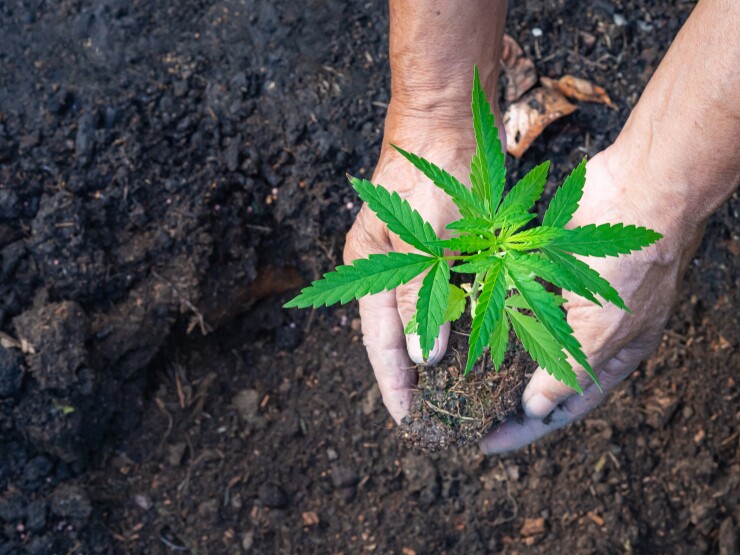The continued classification of marijuana as a Schedule I controlled substance has put cannabis businesses in a bind as far as federal taxes go, even as more states have moved to legalize recreational and medical use of marijuana.
The Department of Health and Human Services made an official recommendation in August to the Drug Enforcement Administration to move cannabis from its status as a Schedule I controlled substance to Schedule III. Such a move could lead to the availability of federal tax deductions and credits and provide relief to legal cannabis businesses that are struggling to become profitable.
Lawmakers, despite Congress's persistent dysfunction, have been trying to remedy the problems. In April, Rep. Earl Blumenauer, D-Oregon,

Such a bill could help cannabis businesses cope with their taxes. "Cannabis right now is a Schedule I controlled substance, so it's on the same list as heroin and some other really unsavory illegal drugs, ones that you would normally think of as things people go to jail for," said Kristin Kowalski, a partner in the tax practice at The Bonadio Group in Syracuse, New York. "Schedule I means that the DEA considers it to have no possible useful medical benefit, it's not useful for research, and there's nothing about it that warrants it being out in the United States, so all of the states that have legalized it are obviously in direct conflict with that standing of it being on Schedule I."
She sees potential significance in the DHS move to reclassify cannabis, at least from a tax perspective. "It's pretty monumental that the Department of Health and Human Services has proposed that it should be moved to Schedule III," said Kowalski. "If it's on Schedule III, that doesn't make it legal. It doesn't make banking available. There's a lot that it doesn't do. But the one thing it does do is it takes away the burden of Code Section 280E, which is the Tax Code section that says no deductions are available for trades or businesses that are trafficking in Schedule I or II controlled substances. It's a very important thing to note that 280E specifically references just Schedules I and II."
The timeline is uncertain not only for Congress to act, but also the DEA. "The Department of Health and Human Services did a bunch of research and scientific studies on it, so they made a formal recommendation for the DEA to consider rescheduling it so the ultimate decision lies with the DEA," said Kowalski. "They can do some additional research on their own, and there's really no way of knowing how long it will take to move through those administrative processes, and how they will ultimately decide. Of course, cannabis is always a political issue as well, so there might be some influence with the upcoming elections. It's just hard to predict what will happen. As of now, it's just a recommendation. Nothing's changed. But it's still noteworthy, especially for those who operate in the legalized states."
As of Apr. 24, 2023, 38 states, three territories and the District of Columbia allow the medical use of cannabis products,
Until the DEA acts, the use of tax deductions is severely limited by cannabis businesses. "Right now all cannabis businesses are subject to 280E, which means that they can't take any deductions," said Kowalski. "They are taxed based on their gross revenue. That's their receipts, minus cost of goods sold. All they can subtract is cost of goods sold, but everything else — your marketing overhead, utilities, rent, especially if you're a dispensary — none of that is deductible. Plus you can't take any federal tax credits either. There are very high effective tax rates in the cannabis world."
Until the SAFER Banking Act passes, cannabis businesses will also have trouble accessing the banking system, so many of their transactions have to be done in cash, making them vulnerable to robbery. Accountants can still help clients in the cannabis business, however, even if some of the traditional tax advice won't apply to them.
"Because cost of goods sold is the only deduction, they are precluded from using 263A to capitalize indirect costs into inventory, so they have to only strictly follow 471, for example, for inventory accounting," said Kowalski. "There's just not a lot of flexibility with things you can do in cannabis. And most of the planning people do circulates around trying to separate out trades or businesses that are subject to 280E that are plant touching from those that aren't. And that's where most of the court cases right now that you've seen move through the federal system, what they center around."
Last year, The
"The court cases that are out there, they've drawn a pretty hard line," said Kowalski. "It's a high burden of proof to show that you have a separate trade or business that can stand on its own. Things that won't work are setting up a management company and piling all of your expenses in there and then charging just a management fee over to the plant-touching entity, basically trying to pack deductions into this management company. That won't work. It's been shut down by the courts. Having a rack of T-shirts at your dispensary and saying that's a separate trade or business and trying to put a bunch of expenses claiming that for retail, that doesn't work. So it has to be a pretty clearly delineated separate business that can stand on its own if you took away the adult use."
Even states like New York that have legalized cannabis are still restricting the number of dispensaries they will allow to open, with only about
"The most important thing that we see is because there's nothing you can do about these tax obligations is to pay really close attention to your cash management," said Kowalski. "You run into these cases where if they've spent the cash, they don't have it to make their tax payments, and that leads to many problems. Cash management becomes really front of mind for these businesses when they're paying such a big percentage of their profits over to taxes. It's also good to note that a lot of the states where they have legal adult use cannabis, New York included, they've decoupled from 280E. While you can't get those deductions for federal, you can take them on your state return, it helps a little bit with the tax burden."
Other states that have legalized cannabis, including California and Colorado, have similarly "decoupled" from the federal tax laws. "It's usually something that goes along with legalization, as the states are trying to encourage economic growth," said Kowalski. "But interestingly, New York City has not decoupled from 280E yet. It has been passed, but it has not yet been signed. That's an interesting thing for the New York City dispensaries to have to deal with."
On the federal level, if cannabis is moved off of Schedule I, that would bring many more tax benefits to dispensaries across the country.
"Rescheduling would look really similar to what happened when the Farm Bill of 2018 descheduled hemp," said Kowalski. "Hemp also used to be on Schedule I along with cannabis, and that was moved completely off. It's not considered a controlled substance at all, so it's completely legal. And all of a sudden, we had all these hemp growers who now were eligible for all these same tax benefits."
That led to a profusion of hemp-related products, such as CBD gummies and oil. "It's definitely something needed for an industry that, especially in New York, most of the cultivators have to grow outside, and so they face a lot of uncertainty as far as their crops," said Kowalski. "In the New York industry, where there's not a lot of channels for retail right now, it would make a big difference economically for sure."





